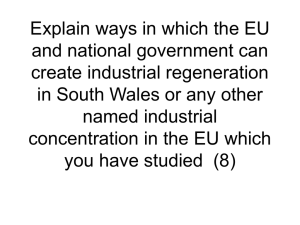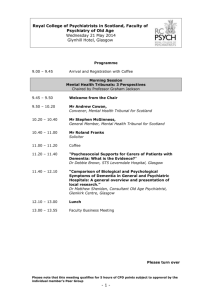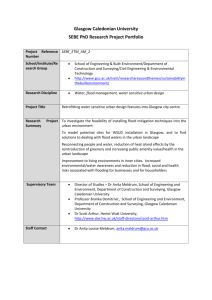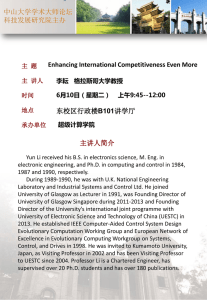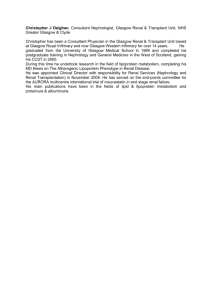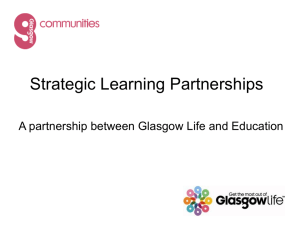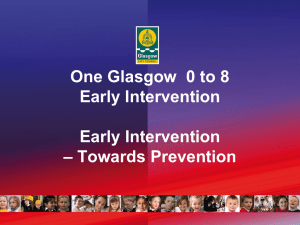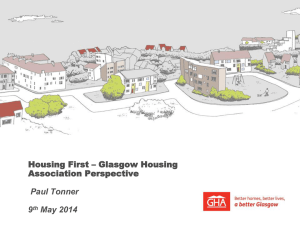St Mungo Festival Service at Glasgow Cathedral
advertisement
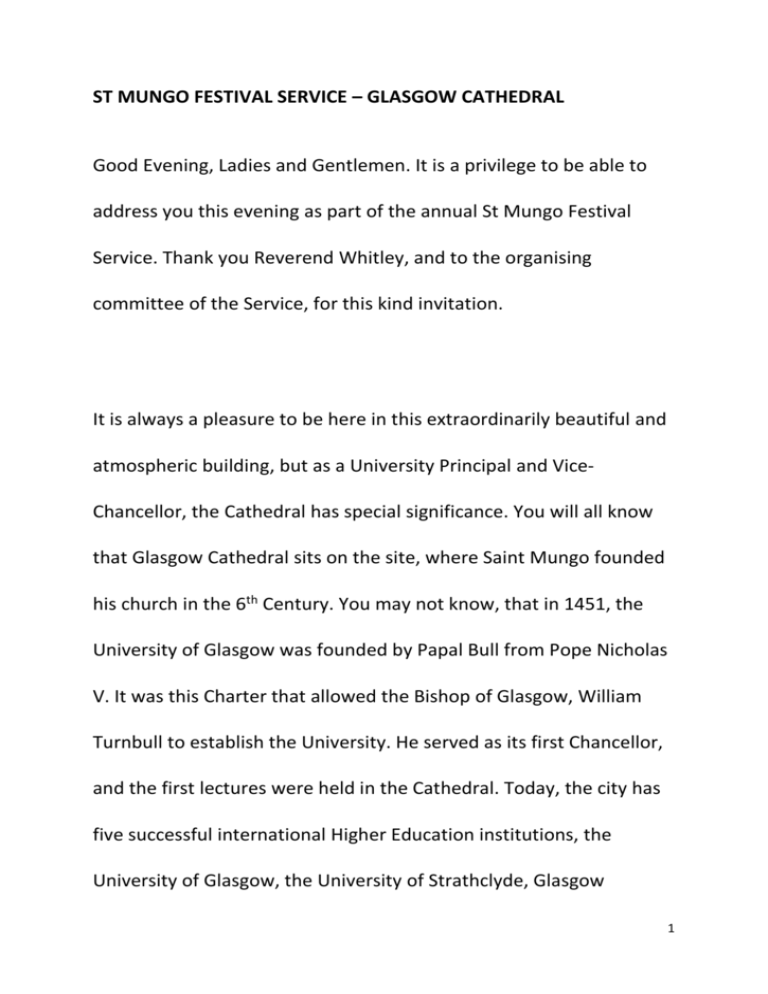
ST MUNGO FESTIVAL SERVICE – GLASGOW CATHEDRAL Good Evening, Ladies and Gentlemen. It is a privilege to be able to address you this evening as part of the annual St Mungo Festival Service. Thank you Reverend Whitley, and to the organising committee of the Service, for this kind invitation. It is always a pleasure to be here in this extraordinarily beautiful and atmospheric building, but as a University Principal and ViceChancellor, the Cathedral has special significance. You will all know that Glasgow Cathedral sits on the site, where Saint Mungo founded his church in the 6th Century. You may not know, that in 1451, the University of Glasgow was founded by Papal Bull from Pope Nicholas V. It was this Charter that allowed the Bishop of Glasgow, William Turnbull to establish the University. He served as its first Chancellor, and the first lectures were held in the Cathedral. Today, the city has five successful international Higher Education institutions, the University of Glasgow, the University of Strathclyde, Glasgow 1 Caledonian University, The Glasgow School of Art and The Royal Conservatoire of Scotland. They all contribute to the culture of our great city and to the combined value of nearly a billion pounds to the city’s economy every year. I can assure you this vast sum does not come solely from students engaging in lots of eating, drinking and retail therapy. As we look to a New Year with hope, expectation and excitement, I cannot help but reflect on what a difficult beginning and end to the year it was for so many families in the city. At the beginning of the year, the city was still mourning the shocking loss of ten of our citizens in the appalling Clutha Vaults pub helicopter accident. We can well remember the stories of how, in the immediate aftermath of that accident, the people of Glasgow ran into danger to try help survivors. Ordinary civilians bravely demonstrating their strength of character in that terrible accident was mirrored by our firefighters who saved the Rennie Mackintosh Building from a raging fire in May. 2 Without their intervention the building would have been forever lost to us, but the speed with which Director, Tom Inns and his team reacted to the horrible fire meant that thankfully no precious lives were lost. But then just before Christmas past another dreadful accident in our City Centre resulted in the tragic loss of six lives. Nothing we might say can assuage the grief experienced by the loved ones of those that were lost, but I hope it is has been some small comfort for families to know that as they grieved, their city grieved with them. The informal memorial at George Square, at which more and more flowers continue to be placed, shows the depth of emotion that our people still feel. In the past year, Glasgow has been the location for another form of remembrance. In August, here in Glasgow Cathedral, a commemorative service was held to mark the centenary of the 3 outbreak of World War One, and remember those who died and suffered in the Great War, particularly from the Commonwealth nations. It was attended by Prince Charles, the Prime Minister, the First Minister and other Commonwealth heads of government, and featured speeches by Sir Trevor McDonald and Kate Adie. In total, 200,000 Glaswegian men went to war from Glasgow, 35,000 were left badly injured, and 18,000 lost their lives, giving what Abraham Lincoln described as “the last full measure of devotion.” The city also honoured their service with other events, including a light and film show called ‘Glasgow’s War’ projected onto Glasgow City Chambers, and a photographic exhibition of war memorials curated in St Mungo’s Museum. Just before Christmas, I had the opportunity to visit Ypres Cathedral, for a performance featuring the author Michael Morpugo, actress Virginia McKenna and Voices at the Door, of Morpugo’s short story ‘Best Christmas Present Ever.’ This play brings to life the remarkable event in 1914 when German soldiers along the frontline laid down their arms to play football and embrace the joy of Christmas with 4 their British enemies. It was humbling to visit the Menin Gate in Ypres and be informed there that it was a Regiment of Scots who were the first to lay down their rifles to make peace for just one day. Whilst rightly reflecting on some of the difficult issues faced last year, we should of course also remember that 2014 was a truly historic and remarkable year for Glasgow, with so much to celebrate. The highlight was the Commonwealth Games which brought the streets of our city alive. I was privileged to be able to attend the Opening Ceremony for the Games, and whilst I wouldn’t have wanted to try dancing as a Tunnock’s Tea Cake, it was a really spectacular start to a spectacular Games. In the run up to the event, the Queen’s Baton Relay was carried in front of streets lined with people, and we were fortunate enough to host a leg of this at GCU. Our campus was also decorated with colour when the Flag Bearing Ceremony for the Pacific Islands took place. The Games also saw an unprecedented demand for tickets, and they were worth fighting for, 5 as enthusiastic fans were treated to the sight of Scots winning a record haul of medals. The carnival atmosphere extended beyond the sporting venues, with over half a million people visiting the Live Site at Glasgow Green. It was no surprise when at the Closing Ceremony, the President of the Commonwealth Games Federation, Prince Tunku Imran, said: “Glasgow, you really have delivered in every aspect, the best Games ever.” At GCU, we were proud to recognise Glasgow 2014 Chief Executive, David Grevemberg, for the leadership he provided, with an Honorary Degree at our Winter Graduation Ceremony. We should remember however, that the Games would not have been possible, without the 15,000 Clydesiders, those local volunteers, who gave up their time, and were the backbone of the success. From the warmth of their welcome to visitors, to packing out venues, to volunteering, it really was the people of Glasgow that made the Games. 6 And it is wrong to think that the excitement in our city ended in 2014, with the Commonwealth Games and events like the MTV Music Awards. Glasgow has another extraordinary year to look forward to, including hosting the World Championships in Gymnastics and Judo, as well as the MOBO Awards. Our young people will also benefit from the legacy of the venues developed for the Games for decades to come, as we seek to nurture their potential through sport, education and cultural experiences. One of the parts of my role that I most enjoy is hearing about the inspiring work that the students of our institutions engage in. So often our students exemplify the spirit and actions of ‘Glasgow people.’ A particularly inspirational individual, is GCU student and winner of the Sunday Mail Young Scot Award, Gemma Steele. Gemma helped to raise the funds to build and operate an Orphanage in Nakuru, Kenya, whilst also studying Occupational Therapy. Just over two years ago, armed robbers broke into the orphanage, and 7 Gemma was held at machete point during the ordeal. Undeterred, she showed remarkable resilience and bravery by continuing to lead the development of the children’s home, and last she year she was rightly recognised for her achievements. In the same way that the founder of our city, St Mungo, dedicated his life to service and selflessness, Glasgow’s young people can amaze us with their dedication to helping others. Indeed, as I reflected on the past year, it struck me that the phrase ‘People Make Glasgow’ crafted by the very clever Scott Taylor and his team, really is no mere marketing slogan. A city thrives on the quality and character of its people. In my career, I have been fortunate enough to work all over the world, yet during my eight years in Glasgow, I have been truly struck by the exceptional qualities of its people. It is a spirit that transformed a tiny settlement on the Molendinar Burn, into a global and 8 cosmopolitan city. It is a spirit that can show dignity and compassion in dark times, but great joy and warmth during times of celebration. So, when I think of this remarkable city and its remarkable people, I have faith that we will continue to live up to the aspirations of its Founder St Mungo, and Glasgow will continue to flourish, or as Councillor Matheson said at the opening of the Games: “Bring it on.” 9
